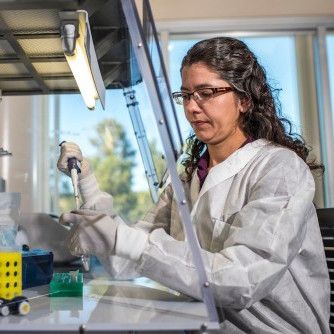Article
Forthcoming Study Will Assess Fiber Intake on Asthma Symptoms
Author(s):
The study will focus on a dozen-plus children with severe asthma over a period of 4 weeks.

Emily Cope, PhD
Leading lung health organizations such as the American Lung Association (ALA) currently state there is no specific diet recommendation for asthma, but an upcoming study wants to explore if a diet high in soluble fiber might help relieve asthma symptoms.
The research, led by Emily Cope, PhD, assistant professor of microbiology at Northern Arizona University (NAU) and assistant director of the Pathogen and Microbiome Institute, will consist of a two-year study of 10-20 children, aged 6-17 years old, from the Severe Asthma Clinic at Phoenix Children’s Hospital.
The subjects will be randomly selected to consume prebiotic soluble fiber in the form of a fruit-flavored drink for 4 weeks, or placebo. Blood, stool, and nasal samples will be tested to evaluate results.
Cope will partner with Matthew Rank, MD, and Devyani Lal, MD, both from Mayo Clinic; pediatric pulmonologist James Woodward, MD, from Phoenix Children’s Hospital; and associate professor Andy Koppisch, PhD, from NAU.
Cope expects to see increased fiber fermenting bacteria in the gut microbiota after supplementation and increased short-chain fatty acids that will lower airway inflammation.
“I think that nutritional intervention to alter gut microbiome function represents a unique way to augment current treatment strategies across all socioeconomic statuses,” Cope told MD Magazine®.
While the term “microbiome” is decades old and was used to reference the ecology of plant and animal life, it did not begin to enter the public consciousness until 2001 when molecular biologist and Nobel laureate Joshua Lederberg defined it as the “ecological system of commensal, symbiotic, and pathogenic microorganisms that reside in the human body.”
Almost 20 years later, research has discovered that some diseases may be linked to microbiome status, but we are not even close to a complete understanding of what some call our “second genome”.
This project is being funded by the Flinn Foundation’s Translational Research in Precision Medicine Seed Grant Initiative. Mostly focused on healthcare, within the last 20 years, the organization has broadened that focus to supporting advancements in the bioscience sector.
“Our primary intent [with the seed grant] is to bring clinicians and scientists together to really speed up the rate of translation of new knowledge into the general population,” Mary O’Reilly, Flinn Foundation vice president of Bioscience Research Programs, told MD Mag. “As a research scientist, she is highly collaborative in working across teams and those components of translational science are very important.”
Cope said her team does not expect to see stark differences in this small study, but they will use this preliminary data to apply for the National Institutes of Health RO1 grant to fund a large clinical trial.




